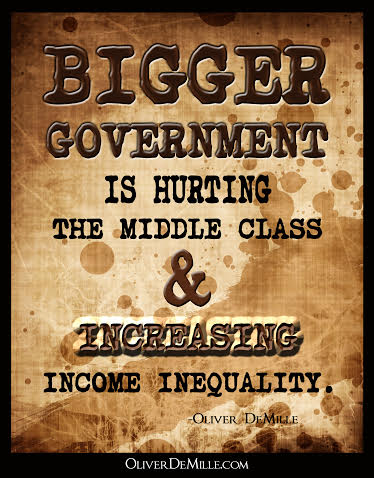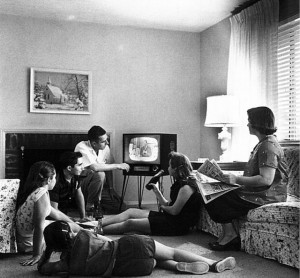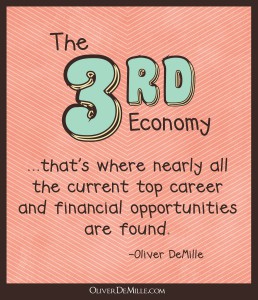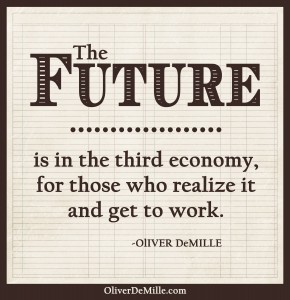THE REAL BATTLE OF OUR TIMES
October 26th, 2016 // 6:40 am @ Oliver DeMille
And the Real Need in the 2016 Election
Vital Point #1
 We need a Congress that will finally stand up for the American people and get serious about adopting policies that bring a more genuinely free—and therefore booming—economy.
We need a Congress that will finally stand up for the American people and get serious about adopting policies that bring a more genuinely free—and therefore booming—economy.
While the mainstream media focuses on the presidential election, the real battle will be for Congress. Even some members of Congress argue that winning the White House for their party will make all the difference—but that’s only true if the next Congress remains weakly afraid to take on the Oval Office and use the power of the purse to put our economy back on track. The American framers set up the Constitution with exactly this in mind: a strong Congress that keeps the president in check.
Many people consider this election one of the most important of our generation. And it is, but not because of the presidential contest. Put simply:
Regardless of who wins the White House this year, the real issue will be whether we have a weak Congress who lets the executive branch keep increasing spending and decreasing freedoms—or a strong Congress that understands what the Framers intended and uses their Constitutional powers to get our economy back to true free enterprise.
 No matter who becomes president, this one issue will determine our future.
No matter who becomes president, this one issue will determine our future.
The voters need to understand this, and keep their eye on the ball. This is extremely important.
The two things the next president will do that are near this level of importance are 1) to appoint new members of the Supreme Court, and, 2) heaven forbid, to deal with a major national security problem. So, obviously, the executive election matters as well. But without the right Congress, we’re in for major decline in the coming years—no matter who occupies the Oval Office.
Vital Point #2
The real battle isn’t what most people think. It is being waged in both subtle and open ways, but academia and media seldom mention it directly. Yet this battle will determine our future.
Many think the great battle of our times is one of the following:
- Socialism vs. Capitalism
- International Interventionism vs. America First
- China vs. the United States
- Conservatives vs. Liberals
- Globalism vs. Nationalism
None of these is even close to our biggest challenge. Today’s great war for our future is much larger, significantly deeper, and more impactful than any of these. The great battle of our times is:
Elitism vs. Enterprise
More specifically: Top-Down Elitism vs. Grassroots Free Enterprise. Note that elitism thrives when a few super-rich at the top dominate finance, politics, media, and culture in our society. Enterprise flourishes where the regular people—the masses—have great economic opportunity and as a group determine our economy, government, and social customs/values.
 Elitism rules from a few top banks, governmental institutions, exclusive universities, elite media firms, and dominant corporations. Enterprise drives society from the basis of strong families, communities, churches, voluntary service organizations, and small businesses.
Elitism rules from a few top banks, governmental institutions, exclusive universities, elite media firms, and dominant corporations. Enterprise drives society from the basis of strong families, communities, churches, voluntary service organizations, and small businesses.
But there’s more: Elitism today dominates the top organizations promoting both socialism and capitalism, and it makes up the Establishment of both major political parties. Elitist banks and corporate leaders control the management of those seeking both globalism and national strength. The leading media and academic hawks and doves are nearly all elitists. Elites win by controlling both sides of things—wherever they can.
Elitist investment rules the corporate world, top media providers, and the most powerful special interest groups. Elitist philanthropy controls higher education, the most influential think tanks, and many of the most powerful foundations (most of which operate quietly behind the scenes).
In America, the word Enterprise is frequently coupled with its partner, freedom, in the phrase “Free Enterprise”; but “Free Elitism” is an oxymoron. If it’s truly free, it isn’t elitist.
Indeed, it is elitist influence in Congress and the media that circumvents the Constitution by convincing the House not to utilize its power of the purse to check the White House, the Court, or the Senate. So, yes, the real need in this election is to elect the right Congress—men and women who will use the Constitution as intended.
Action Plan
But the real war runs much deeper: Getting regular people to choose enterprise over elitism, in their votes for Congress and in their everyday education, career and cultural choices as well. This war—to awaken the people to the reality of top-down ruling elitism vs. grassroots free enterprise, and get them to take a stand for free enterprise—is the great battle of our times.
This starts with the most basic principles of learning and livelihood. On an educational level: If you’re not regularly reading the great books, great classics, and great ideas, you’re part of the problem. Concerning career: If you’re not engaging or strongly supporting entrepreneurial ventures, or (at the very barest minimum), encouraging entrepreneurialism among the youth, you’re part of the problem.
 If you’re swayed by the education/career conveyor belt, or pushing your children and grandchildren into it, you’re part of the problem. If you’re swayed by the elitist Establishment that dominates both political parties, or their media partners, you’re part of the problem. And if you’re caught in the socialist vs. capitalist or national versus globalist debates (all of which are ultimately led by elitists), you’re part of the problem.
If you’re swayed by the education/career conveyor belt, or pushing your children and grandchildren into it, you’re part of the problem. If you’re swayed by the elitist Establishment that dominates both political parties, or their media partners, you’re part of the problem. And if you’re caught in the socialist vs. capitalist or national versus globalist debates (all of which are ultimately led by elitists), you’re part of the problem.
Elitism wins as long as the masses play the elitist’s game. Indeed, many people are actually supporting elitism, either by giving up on their dreams and simply settling for whatever job pays the bills, or by trying to climb the elite ladder and become part of the elite themselves (and/or guiding their children toward the same).
The solution is enterprise. What is your mini-factory, your enterprising project (or projects) that fuels your passion and have the potential to greatly improve the world? If you don’t have such a mini-factory—or find yourself seldom working on it—you aren’t fighting the great battle of our time. And our side is losing.
This battle is real. Current. Dramatic.
It is happening right now.
We need to win it for freedom, for our children and grandchildren, for the future of families and morality and goodness. Which means this: We need your involvement.
Right now.
(To learn more about creating your own personal mini-factory, and how this will win the battle of our times, read The Coming Aristocracy by Oliver DeMille. Available at the Leadership Education Store)
Category : Aristocracy &Blog &Business &Citizenship &Community &Constitution &Culture &Current Events &Economics &Education &Entrepreneurship &Family &Featured &Foreign Affairs &Generations &Government &History &Leadership &Liberty &Mini-Factories &Mission &Politics &Producers &Statesmanship
An Update on the U.S. Economy
November 19th, 2015 // 2:28 pm @ Oliver DeMille
All in the Family
 A poll by the Pew Research Center shows that, beginning in 2014, the percentage of young women living at home or with family members is the highest since 1940. The number of young men moving home is also growing rapidly, but hasn’t quite topped the 1940 mark yet.
A poll by the Pew Research Center shows that, beginning in 2014, the percentage of young women living at home or with family members is the highest since 1940. The number of young men moving home is also growing rapidly, but hasn’t quite topped the 1940 mark yet.
A significant factor in this shift is that more and more young college graduates are unable to find jobs. Another contributor is that many of the jobs young people do find don’t pay as much as they did for twenty-somethings over the past several decades.
Beyond the college changes, high rent and higher costs of living for everyone are contributing to this change. In short, more young people are staying or moving back home.
Could this be a cyclical return to the multi-generational family households that dominated the 1930s? If so, we would expect to see more grandparents moving in with middle-age children and their families (or vice versa)—and, in fact, this is also occurring. Some eras of history—those with long economic downturns or very slow economic growth—naturally tend toward multi-generational families.
Still Sputtering
Overall, the U.S. economy is still struggling, even though the Great Recession began seven years ago, and even though Washington claims it ended four years ago. But since 2011, we’ve seen only very small growth in the U.S. economy, around 1-2% annually.
For many people, this level of growth doesn’t keep up with the annual increases in their expenses. Many families still feel like the Great Recession never ended, because they seem to be falling further behind. And while the Obama Administration touts the increased numbers of jobs in the past four years, most of these jobs pay much less, and offer fewer benefits (if any), than those so many people lost between 2008 and 2012.
In other words, the recession may technically be over—on paper—but look at the numbers more closely and the economy is still sputtering. Over ninety thousand Americans have now stopped looking for work, so the lower unemployment numbers don’t really mean that lots of jobs—or good jobs—are back.
They aren’t.
The New Economic Normal?
All in all, the Obama Administration has taken the approach that 1-2 percent annual growth for our economy—with lower-paying jobs and more people relying on increased government benefits to survive—is the new normal. The Hillary Clinton and Bernie Sanders campaigns have voiced the same sentiment.
In fact, the Democratic candidates daily make the case that government should offer many more programs (a national $15 minimum wage, free college, increased welfare funds, etc.) so people can get used to making do, even without jobs. Obamacare already did this for health care, though rising costs are causing numerous problems for those who do pay for their own health care.
In contrast, many of the Republican candidates for the 2016 election have argued that we need to get back to 4% annual growth or much, much higher. Whether any of the candidates can win in 2016, and then actually do something to significantly boost the economy, remains to be seen.
We may well be at a national crossroads. If we follow the Democratic path, we’ll increase taxes and depend more on government to help families make ends meet. And paying the bills will be increasingly difficult.
If we adopt the perspective of some Republicans that we really can reboot the economy and spur 4%, 6%, or even higher growth, we can restart the American Dream for the current and next generation. But can any of the Republican candidates actually do it? Only time will tell. At least some of them are trying.
What Actually Works
Let’s be clear. Governments don’t spur economic booms. Entrepreneurs, small businesses, and big businesses that expand and hire do. But when the government regulatory burden and tax rates are as high as they are right now, it’s going to take some government action to free up the economy and incentivize more entrepreneurs and businesses to take action toward major growth.
As for the trillions of dollars held by U.S.-based corporations abroad, the government needs to bring our tax rates down to the point that it makes sense to bring this money back home to the U.S. economy. So, yes, the free economy needs real relief from government right now.
The next election could make all the difference. We’ll either reinforce the Obama legacy and put more people into low-paying (or no) jobs and onto government benefit rolls, or we’ll reboot the economy by freeing it up and incentivizing free enterprise growth, hiring, and expansion.
These are two very clear, opposite directions, and only one of them even has the chance of benefiting American freedom and prosperity in the years ahead. Our economy is at stake.
Category : Blog &Citizenship &Community &Culture &Current Events &Economics &Education &Family &Generations &Government &History &Leadership &Liberty &Politics
The Article of the Year!
December 13th, 2014 // 9:53 am @ Oliver DeMille
The Best…
 Last week Rachel asked me if I was going to write a “best books of the year” article like I have the last few years. “I’m not sure,” I sighed. “To tell the truth, I think it’s getting a little old. I see ‘best books,’ ‘best movies,’ ‘best albums,’ of the year, etc. in most of the national magazines and newspapers each year. In fact, I just recently read a December issue of a magazine that listed the ‘5 best of the year’ in all these categories. I think it’s a bit overdone these days.”
Last week Rachel asked me if I was going to write a “best books of the year” article like I have the last few years. “I’m not sure,” I sighed. “To tell the truth, I think it’s getting a little old. I see ‘best books,’ ‘best movies,’ ‘best albums,’ of the year, etc. in most of the national magazines and newspapers each year. In fact, I just recently read a December issue of a magazine that listed the ‘5 best of the year’ in all these categories. I think it’s a bit overdone these days.”
“That makes sense,” she responded. “But the end of the year is a profound time to look back and note important things that have happened. It’s natural, and it is good for us.” She pondered for a minute, then said enthusiastically, “What about a ‘best article of the year?’ Is there an article you wrote this year that you think is the most important one? Something everyone in America and beyond really needs to read?”
I immediately brightened and sat forward in my seat. “Yes!” I said. “There’s one article I wrote that I wish I could send out every week, over and over. I wish every person in North America would read it! And Europe, and beyond. It’s that important.”
“What is it?”
Well, here it is. The “Article of the Year!” If you read it before when it came out, please, please read it again. It’s that powerful. It’s that important. And if you haven’t read it before, now is the time.
The message of this article is extremely important! If you have children or grandchildren who will live, seek an education, and work in the next thirty years, the information in this article is vital. Absolutely vital. If you or your spouse will work in the next year, or three years, or ten years, the knowledge in this article is essential. This is an article on education, on leadership, and on the economy. Nobody should have to face the economy ahead without knowing what’s in this article! Read it! Enjoy it! Share it!
Here goes:
A Tale of Two
There are three economies in modern society. They all matter. But most people only know about two of them. They know the third exists, in a shadowy, behind-the-scenes way that confuses most people. But the first two economies are present, pressing, obvious. So people just focus on these two.
A couple of recent conversations brought these economies even more to the forefront of my thinking. First, I was meeting with an old friend, touching base about the years since we’d talked together. He mentioned that his oldest son is now in college, and how excited he is for his son’s future. I asked what he meant, and he told me an interesting story.
Over twenty years ago he ran into another of our high school friends while he was walking into his community college administration building. The two greeted each other, and they started talking. My friend told his buddy that he was there to dis-enroll from school. “I just can’t take this anymore,” he told him. “College is getting me nowhere.”
“Well, I disagree,” his buddy said. “I’m here to change my major. I’m going to get a teaching credential and teach high school. I want a steady job with good benefits.”
Fast forward almost thirty years. My friend ran into this same old buddy a few weeks ago, and asked him what he’s doing. “Teaching high school,” he replied.
“Really? Well, you told me that was your plan. I guess you made it happen. How much are you making, if you don’t mind me asking?”
When his friend looked at him strangely, he laughed and said, “I only ask because you told me you wanted a steady job with good benefits, and I wanted to get out of school and get on with real life. Well, I quit school that day, but I’m still working in a dead end job. Sometimes I wonder what I’d be making if I had followed you into the admin building that day and changed majors with you.”
After a little more coaxing, the friend noted that he didn’t make much teaching, only about $40,000 a year—even with tenure and almost thirty years of seniority. “But it’s steady work, like I hoped. Still, I’ve got way too much debt.”
After telling me this story, my old high school friend looked at me with what can only be described as slightly haunted eyes. “When he told me he makes $40K a year, I just wanted to scream,” my friend said.
“Why?” I asked.
He could tell I didn’t get what he was talking about, so he sighed and looked me right in the eyes. “I’ve worked 40 to 60 hour weeks every month since I walked off that campus,” he told me. “And last year I made about $18,000 working for what amounts to less than minimum wage in a convenience store. I should have stayed in college.”
That’s the two economies. One goes to college, works mostly in white-collar settings, and makes from thirty thousand a year up to about seventy thousand. Some members of this group go on to professional training and make a bit more. The other group, the second economy, makes significantly less than $50,000 a year, often half or a third of this amount, and frequently wishes it had made different educational choices.
The people in these two economies look at each other strangely, a bit distrustfully, wondering what “could have been” if they’d taken the other path. That’s the tale of two economies.
Most people understand the first two economies, but the Third Economy is elusive for most people. They don’t quite grasp it. In fact, you may be wondering what I’m talking about right now.
The Third Economy
This brings me to our main point. Ask members of either economy for advice about education and work, and they’ll mostly say the same thing. “Get good grades, go to college, get a good career. Use your educational years to set yourself up for a steady job with good benefits.” This is the advice my grandfather gave my father at age twenty, and the same counsel my dad gave me after high school. Millions of fathers and mothers have supplied the same recommendations over the past fifty years.
This advice makes sense if all you know are the two economies. Sadly, the third economy is seldom mentioned. It is, in fact, patently ignored in most families. Or it is quickly discounted if anyone is bold enough to bring it up.
 A second experience illustrates this reality. I recently visited the optometrist to get a new prescription for glasses. During the small talk, he mentioned that his younger grandchildren are in college, but scoffed that it was probably a total waste of time. “All their older siblings and cousins are college graduates,” he said, “and none of them have jobs. They’ve all had to move back home with their parents.”
A second experience illustrates this reality. I recently visited the optometrist to get a new prescription for glasses. During the small talk, he mentioned that his younger grandchildren are in college, but scoffed that it was probably a total waste of time. “All their older siblings and cousins are college graduates,” he said, “and none of them have jobs. They’ve all had to move back home with their parents.”
He laughed, but he seemed more frustrated than amused. “It’s the current economy,” he continued. “This presidential administration has been a disaster, and it doesn’t look like anyone is going to change things anytime soon. I don’t know what these kids are supposed to do. They have good degrees—law, accounting, engineering—but they can’t find jobs. Washington has really screwed us up.”
I brought up the third economy, though I didn’t call it that. What I actually said was: “There are lots of opportunities in entrepreneurship and building a business right now.” He looked at me like I was crazy. Like maybe I had three heads or something. He shook his head skeptically.
“Entrepreneurship is hard work,” I started to say, “but the rewards of success are high and…”
He cut me off. Not rudely, but like he hadn’t really heard me. That happens a lot when you bring up the third economy.
“No,” he assured me, “college is the best bet. There’s really no other way.”
I wasn’t in the mood to argue with him, so I let it go. But he cocked his head to one side in thought and said, slowly, “Although…” Then he shook his head like he was discounting some thought and had decided not to finish his sentence.
“What?” I asked. “You looked like you wanted to say something.”
“Well,” he paused…then sighed. I kept looking at him, waiting, so he said, “The truth is that one of my grandsons didn’t go to college.” He said it with embarrassment. “Actually, he started school, but then dropped out in his second year. We were all really worried about him.”
He paused again, and looked at me a bit strangely. I could tell he wanted to say more, but wasn’t quite sure how to go about it.
“What happened?” I prompted.
What Really Works
“To tell you the truth, I’m not really sure. He started a business. You know, one of those sales programs where you build a big group and they buy from you month after month. Anyway, he’s really doing well. He paid off his big house a few years ago—no more mortgage or anything. He has nice cars, all paid for. And they travel a lot, just for fun. They fly chartered, real fancy. He and his wife took us and his parents to Hawaii for a week. He didn’t even blink at the expense.”
“That’s great,” I told him. “At least some people are doing well in this economy.”
He looked at me with that strange expression again. “I’m not sure what to make of it,” he said. “I keep wondering if he’s going to finish college.”
I was surprised by this turn of thought, so I asked, “So he can get a great education, you mean? Read the classics? Broaden his thinking?”
He repeated the three heads look. “No. He reads all the time, way more than anyone else in the family. He doesn’t need college for that. I want him to go back to college so he can get a real job.”
I laughed out loud. A deep belly laugh, it was so funny. I didn’t mean to, and I immediately worried that I would offend him, but he grinned. Then he shook his head. “I know it’s crazy, but I just keep worrying about him even though he’s the only one in the family who is really doing well. The others are struggling, all moved back in with their parents—spouses and little kids all in tow. But they have college degrees, so I keep thinking they’ll be fine. But they’re not. They’re drowning in student debt and a bunch of other debts. It just makes no sense.”
He sighed and talked bad about Washington again. Finally he said, “I’ve poured so much money into helping those kids go to college, and now the only one who has any money to raise his family is the one who dropped out. It just doesn’t make any sense.” He kept shaking his head, brow deeply furrowed.
I left his office thinking that he’s so steeped in the two economies he just doesn’t really believe the third economy exists. He just doesn’t buy it, even when all the evidence is right there in front of him. The whole economy has changed. It’s not your father’s or grandfather’s economy anymore. It just isn’t. Sadly, he just doesn’t get that the reality has changed.
Who Gets It
He’s not alone. The whole nation—most of today’s industrialized nations, in fact—are right there with him. So many people believe in the two economies, high school/blue collar jobs on the one hand, and college/white collar careers on the other. Most people just never quite accept that the entrepreneurial economy is real. They don’t realize that there are many less white collar jobs per capita now, and that this trend shows all the signs of increasing. They don’t admit the truth, that over half of college grads in recent years can’t find jobs, and a huge number of those with degrees and without degrees are moving back home just to survive. But the third economy is flourishing.
It’s too bad so many people won’t admit this, because that’s where nearly all the current top career and financial opportunities are found. The future is in the third economy, for those who realize it and get to work. If you’ve got kids, I hope you can see the third economy—for their sake. Because it’s real, and it’s here to stay. The first two economies are in major decline, whatever the so-called experts claim. Alvin Toffler warned us in his bestseller FutureShock that this was going to happen, and so did Peter Drucker, back when they first predicted the Information Age. Now it’s happening.
I hope more of us realize the truth before it’s too late. Because China gets it. So does India, and a bunch of other nations. The longer we take to get real and start leading in the entrepreneurial/innovative third economy (the real economy, actually), the harder it will be for our kids and grandkids. The third economy will dominate the twenty-first century. It already is, in fact. Whether you’ve chosen to see it yet or not. This is real. This is happening. This is the future. This is the current reality.
Truth is truth, even when our false traditions and outdated background refuse to let us see clearly. The parents who see this, embrace it, and help their kids prepare to take action in the third economy are providing a real education for their family. Everyone else…isn’t.
 Oliver DeMille is the New York Times, Wall Street Journal and USA Today bestselling co-author of LeaderShift: A Call for Americans to Finally Stand Up and Lead, the co-founder of the Center for Social Leadership, and a co-creator of TJEd.
Oliver DeMille is the New York Times, Wall Street Journal and USA Today bestselling co-author of LeaderShift: A Call for Americans to Finally Stand Up and Lead, the co-founder of the Center for Social Leadership, and a co-creator of TJEd.
Among many other works, he is the author of A Thomas Jefferson Education: Teaching a Generation of Leaders for the 21st Century, The Coming Aristocracy, and FreedomShift: 3 Choices to Reclaim America’s Destiny.
Oliver is dedicated to promoting freedom through leadership education. He and his wife Rachel are raising their eight children in Cedar City, Utah
Category : Blog &Business &Community &Culture &Current Events &Economics &Education &Entrepreneurship &Family &Featured &Generations &Government &History &Leadership &Liberty &Mini-Factories &Mission &Producers &Statesmanship
Education Exposed
October 28th, 2014 // 3:24 pm @ Oliver DeMille
Hire and Higher and Hire
 Just read the following quote. It is incredibly powerful:
Just read the following quote. It is incredibly powerful:
“Universities…have been absorbed into the commercial ethos. Instead of being intervals of freedom, they are breeding grounds for advancement. Students are too busy jumping through the next hurdle in the résumé race to figure out what they really want…. They have been inculcated with a lust for prestige and a fear of doing things that might put their status at risk. The system educates them to be excellent, but excellent sheep.”
This is a profound and all too accurate description of our current educational system. It was written in the New York Times by David Brooks, as a summary of a William Deresiewicz’s essay in his book Excellent Sheep.
Let’s briefly consider each main point:
- “Universities…have been absorbed into the commercial ethos. Instead of being intervals of freedom, they are breeding grounds for advancement.”
This is true of schools in general today, at all levels. Most people now see the goal of almost all schools as job preparation, as Hire Education instead of Higher Education.
In this model, the quality of learning isn’t important. Job placement is the goal, and it drives the whole educational system.
Moving Backwards
Sadly, it drives it down, not up. As the quality of education decreases, so does the quality (and availability) of jobs for most people.
- “They have been inculcated with a lust for prestige and a fear of doing things that might put their status at risk.”
The conveyor-belt approach to learning trains followers, not leaders. It makes our students and workers risk averse, not creative or entrepreneurial. Our economy is losing jobs by the thousands to nations where initiative, ingenuity, and innovation are rising. In these vital things, our failure rates are growing.
- “The system educates them to be excellent, but excellent sheep.”
Our education system of “students follow, while their superiors tell them what and when to do things—from Kindergarten through graduate school” is creating a populace that obediently takes its marching orders from the media, experts, and government officials. But free societies only stay free when the people are watching things and telling the officials and experts what to do.
We’ve got it backwards. Most of our current educational system is designed for a socialist nation, not for a free one.
Leaders or Drones
There is a solution, and it is for parents and teachers to deliver Leadership Education and teach young people how to think—not what to think.
This has been the focus of our work with TJEd (Thomas Jefferson Education) for over two decades. It’s tenets are simple: classics rather than rote textbooks, mentors rather than professors, personalized learning rather than the conveyor belt, quality rather than conformity, etc.
It all boils down to inspiring students to passionately choose the work of getting a great education, not requiring youth to do the rote behaviors of mediocre learning—or even the rote actions that bring high test scores but turn students into excellent sheep.
In The Atlantic, Sandra Tsing Loh called this “high-class drone work.” Note that she was referring to the prestigious but rote careers that such education leads to, not to the schooling.
Leadership Education is a better way. For everyone.
Simplicity and Success
Just consider another powerful quote, this one from Luba Vangelova writing about the non-traditional revolution in modern education:
“Every day, veteran educator Scott Henstrand walks into his history classroom at the Brooklyn Collaborative secondary school, jots down a few conversation-starters on the blackboard, then takes a seat amongst the 14- to 17-year-olds. He does the same work as they do, and raises his hand when he wants to speak.”
This sounds like a formal school modeled after an excellent Leadership Education homeschool:
- “Inspire, not Require.”
- “Simplicity, not Complexity.”
- “You, not Them.”
- Mixed ages.
- A mentor learning right along with the students.
- Readings and lots of discussions.
Great education is really quite simple, after all, as successful homeschoolers can attest.
For help in engaging your education, and mentoring others in their learning, join us for Mentoring in the Classics >>
 Oliver DeMille is the New York Times, Wall Street Journal and USA Today bestselling co-author of LeaderShift: A Call for Americans to Finally Stand Up and Lead, the co-founder of the Center for Social Leadership, and a co-creator of TJEd.
Oliver DeMille is the New York Times, Wall Street Journal and USA Today bestselling co-author of LeaderShift: A Call for Americans to Finally Stand Up and Lead, the co-founder of the Center for Social Leadership, and a co-creator of TJEd.
Among many other works, he is the author of A Thomas Jefferson Education: Teaching a Generation of Leaders for the 21st Century, The Coming Aristocracy, and FreedomShift: 3 Choices to Reclaim America’s Destiny.
Oliver is dedicated to promoting freedom through leadership education. He and his wife Rachel are raising their eight children in Cedar City, Utah
Category : Blog &Community &Culture &Current Events &Education &Family &Featured &Generations &Leadership &Liberty &Mini-Factories &Mission
Symbolic Language
April 22nd, 2014 // 3:32 pm @ Oliver DeMille
Two Different Americas
There are two classes in modern America, the literal class and the metaphorical class. In the increasing divide between the “haves” and the “have nots,” this language difference is central.
In the increasing divide between the “haves” and the “have nots,” this language difference is central.
Those who don’t understand the language of metaphor are falling behind in the widening gap that is the global economy. They are watching their family’s standard of living decrease over the decades.
This trend will only increase in the years ahead.
Those with a quality education learn to think, to readily see symbolism wherever it is found. But most Americans and Westerners are part of the literal class—symbolism is often lost on them.
They tend to see things without the metaphor.
Parental Guidance
For example, last year a long debate raged on social media about whether or not The Hunger Games trilogy was good or bad reading for youth. The most interesting thing about this debate wasn’t the arguments made by either side, but the fact that symbolism was hardly ever part of the debate.
But the symbolism is glaring: A nation sacrifices its helpless children for the convenience, entertainment, and libertine moral values of the urban upper class, while government, media, and big wealth combine to keep their control over the outlying, rural people dedicated to “archaic” family values.
What could be a closer parallel to our modern society? And what metaphor could ever more clearly point out the hypocrisy of the American cosmopolitan class and its views on abortion?
What Was Missed
To anyone trained in symbolism, the metaphor is obvious. We watch children killed for the convenience and political values of the elite class. And note that in The Hunger Games the urban classes have collectivist economic views combined with libertine moral values—the same as those in the real world who support Roe v. Wade and easy abortion laws in modern America.
This is blatant symbolism, but only the upper classes really understood this.
In fact, some of the most vocal voices declaring that The Hunger Games books and movies are inappropriate for youth came from people who are strongly against abortion.
They just didn’t understand that The Hunger Games was probably the biggest, best, and most popular anti-abortion movie ever. This was entirely lost on the literal classes.
When the ruling classes understand literal and symbolic language, while the masses only understand the literal, freedom is in decline and the power of the ruling classes will only increase.
This was true in Shakespeare’s day, in the time of Virgil, and when the Psalms and Proverbs were written.
The elite classes, steeped in the classics and great books that teach readers how to think (especially symbolically), are always going to rule over the literal classes whose education is limited to getting the “right” answers, preparing for jobs and careers, and not really thinking about things symbolically.
Allan Bloom warned that modern America has this problem at the level of Hitler’s Germany.
The Real Fascination
Another example: People in the literal classes can’t quite understand why today’s youth are so intrigued by vampire books, movies, and television programs. “What is this fascination with vampires?” the literal classes ask.
The elite classes, well-versed in metaphor and symbolism, know better. They understand that vampires are symbols of something—something many young people struggle with.
Imagine a society made up of two major groups. First are the hard-working, regular people who live in middle-class neighborhoods, go to work every day, raise families, sleep during the night (because they have to go to their job tomorrow), send their kids to school in order to get a good career in their adult lives, etc.
The second group in society is made up of a few people who have trust funds, inherited wealth, can get in trouble with the law but get out of it relatively easily, stay up through the night at fancy balls and dinners, then go home in the early morning and sleep late into the day, and have more power, wealth, fun and entertaining lives, and sophisticated connections with other aristocrats far beyond the local community—and even around the world.
The first group envies the second, while the aristocratic second group hardly gives a thought to their “inferiors.” Parents of both groups warn their children not to mix with the other group—because it inevitably causes many problems.
This clearly defines two things: 1) an aristocratic society, like all elite societies that have existed in human history, and 2) every group of vampires portrayed in literature, juvenile fiction, and in movies and TV programs.
But the literal classes mostly miss this symbolism. “Why do the kids like vampires?” the literal classes ask.
Some literal writers even try to explain how youth like to be scared, so they love the idea of biting strangers dressed in black. So literal. So shallow.
Answer: The kids don’t love actual vampires, they love the idea of rising into a higher class. In high school, this is a driving passion for many teenagers. If movies are to be believed, it’s the driving theme for most students in most high schools.
In such an environment, vampires are the shortcut to social success. If one bites you (dates you, likes you, includes you in his group, etc.) you immediately climb to a higher social class. The highest social class, in fact.
The one that has the money, the power, the mystery, and the worldwide connections (rather than the homegrown limits of the coal mines, a job at Blue Bell’s Rammer Jammer, or a lifetime of alumni fundraising for the Friday Night Lights).
The fact that many parents tell you to ignore the vampires (“Don’t worry about high school cliques, or being popular. It won’t even matter after you graduate.”) just adds to the intrigue.
Vampires are aristocrats. Elites. People with enough money, power and connections to ignore the limits most people and families struggle with—as youth, and also as adults.
The kids instinctively understand this, though their literal parents may not.
The Old Tool
This language barrier isn’t new.
In aristocratic Britain, the upper classes pronounced words differently than the lower and working classes—so elites would always know who they were dealing with. In fact, the pronunciations were literal (pronounce every syllable) versus symbolic (skip syllables, if you’ve been trained by other aristos and know what to look for).
For example, the word Worchester was pronounced “wor-ches-ter” by the lower classes, but simply “wis-ter” by the nobles. Or the name St. John was pronounced “Saint John” by working classes but “Sinjin” by nobility (see Jane Eyre). There are thousands of similar words.
This boils down to two classes, the Literal versus Symbolic. Checkers versus Chess. “Tell me the right answer, so you can pass the test and someday get a good job,” versus “Tell me your opinion, because there are many possible correct answers, and our purpose is to help you learn how to think—so you can become a leader.”
These are how public schools versus elite prep schools, respectively, generally teach.
The Price of the Literal
Facts versus Metaphor. Precision versus Imagery. One Meaning versus Poetic Allegory.
Again, the elite classes are well educated in both of these dialects. The problem is that the middle and lower classes are not. They only know the literal meanings of words.
This is a growing concern, because it causes increased divisions between the elites and the regular people. The masses don’t understand what is happening to their society, because they don’t speak the language of metaphor. When President Obama promised, “If you want to keep your doctor [under Obamacare], you can keep your doctor,” the two classes heard very different things.
The literal classes heard: “If you want to keep your doctor, you can keep your doctor.” Hearing this, they planned their family and business finances and voted accordingly.
The symbolic classes, trained in metaphor, heard the following: “If you want to keep your doctor, you can keep your doctor, or at least one that is just as good; or, even if you can’t keep your doctor under the new plan, the nation will be better off, so it’s worth the change anyway.”
The symbolic class knows that political promises are rhetoric, meant to win elections—not meant to actually, literally be fulfilled. The literal class is slowly realizing that this is the case, but they still feel lied to by each new candidate. In reality, they just don’t understand metaphorical language.
A teacher I know once shared the following quote by Groucho Marx with her class: “Outside of a dog, a book is a man’s best friend; inside of a dog it’s too dark to read.” One student was very frustrated with this little proverb. When questioned, the student said emotionally, “This is so cruel to dogs. Why would anyone want to read inside of a dog?”
When the literal class doesn’t easily and immediately understand symbolism, it will lose its freedoms to the elite ruling class that does.
The Missed Symbols
I wonder what people will say about the book and movie popularity of Divergent. It is a great symbolic attack on the modern public school system and the way we choose careers and jobs in the U.S., Canada, and Europe—but I bet there will be a number of homeschoolers, charter school and non-traditional educators and parents who miss some key points.
First: this is not a book for youth; the intermittent suggested sensuality that is predictable and “natural” for youth in crisis who depend upon each other without family support is not suitable for most youth.
Second: this book is for adults, and it may be the best promotion for homeschooling and other cutting-edge, new educational choices since…well, ever.
If non-traditional education seizes this opportunity, there will be a lot of support for Divergent, because people will understand its symbolism: Each person is different, and each person has unique genius inside.
The purpose of education is to help each student discover and develop his or her inner genius and passion, and use it to improve and serve the world. When the focus is on making every child fit in, it’s not education at all. At best it’s training, at worst brainwashing.
This is the overarching message of Divergent—but will it be lost on the literal class? I hope not.
We all can benefit from including more symbolic thinking in our reading. It’s like a new mantra for 21st Century leadership: Read more, think more, serve more. And look for symbols and metaphor in everything you read.
Join Oliver for Mentoring in the Classics >>
 Oliver DeMille is the New York Times, Wall Street Journal and USA Today bestselling co-author of LeaderShift: A Call for Americans to Finally Stand Up and Lead, the co-founder of the Center for Social Leadership, and a co-creator of TJEd.
Oliver DeMille is the New York Times, Wall Street Journal and USA Today bestselling co-author of LeaderShift: A Call for Americans to Finally Stand Up and Lead, the co-founder of the Center for Social Leadership, and a co-creator of TJEd.
Among many other works, he is the author of A Thomas Jefferson Education: Teaching a Generation of Leaders for the 21st Century, The Coming Aristocracy, and FreedomShift: 3 Choices to Reclaim America’s Destiny.
Oliver is dedicated to promoting freedom through leadership education. He and his wife Rachel are raising their eight children in Cedar City, Utah.
Category : Aristocracy &Arts &Blog &Book Reviews &Citizenship &Community &Culture &Education &Family &Leadership &Liberty &Mission











